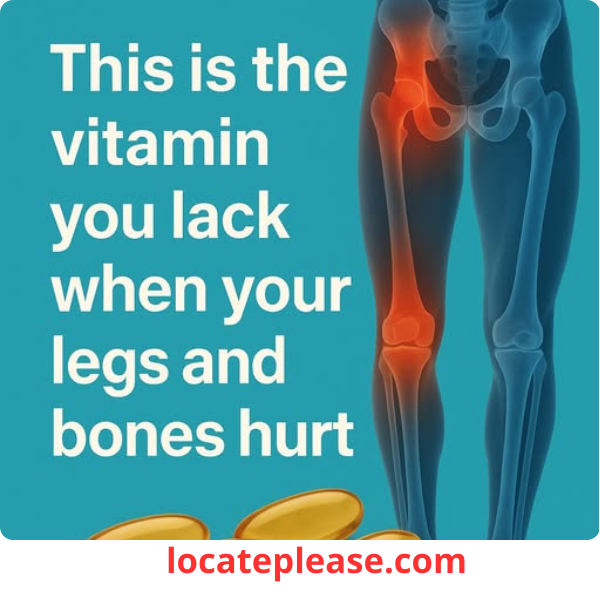Have you ever experienced unexplained leg pain, nighttime cramps, or a nagging ache in your bones — with no injury, overuse, or clear cause?
You might brush it off as “just getting older” or “standing too long.”
But what if your body is sending you a silent alarm?
👉 Vitamin and mineral deficiencies are often overlooked causes of leg pain, muscle weakness, and bone fragility — and they’re more common than you think.
When your body lacks essential nutrients, it can’t maintain strong bones, healthy muscles, or proper nerve function. The result?
Pain, cramps, fatigue, and even an increased risk of fractures.
Let’s explore the key vitamins and minerals your bones and muscles depend on — and how a simple deficiency could be behind your discomfort.
🌞 1. Vitamin D Deficiency: The Silent Cause of Bone Pain
Vitamin D is one of the most critical nutrients for bone and muscle health — yet over 1 billion people worldwide are deficient.
This “sunshine vitamin” helps your body absorb calcium, the building block of strong bones. Without enough vitamin D, your bones can become soft, weak, and painful — even if you’re getting plenty of calcium.
🔻 Symptoms of Vitamin D Deficiency:
- Deep, aching bone pain (especially in legs, hips, or lower back)
- Muscle weakness or heaviness in the legs
- Frequent cramps or spasms
- Increased risk of fractures and falls
- Fatigue and low mood
🧠 Why It Happens:
- Limited sun exposure (especially in winter or urban areas)
- Darker skin tones (melanin reduces vitamin D synthesis)
- Aging (skin becomes less efficient at producing vitamin D)
- Obesity (vitamin D gets trapped in fat tissue)
- Poor diet (few foods naturally contain vitamin D)
✅ How to Get Enough Vitamin D:
- Sunlight: 10–30 minutes of midday sun, several times a week (without sunscreen)
- Food sources: Fatty fish (salmon, mackerel), egg yolks, fortified milk, and mushrooms
- Supplements: Vitamin D3 (cholecalciferol) — commonly recommended at 600–800 IU/day, or more if deficient (check with your doctor)
💡 Tip: Get your vitamin D levels tested — optimal blood levels are 30–50 ng/mL.
💀 2. Calcium Deficiency: The Foundation of Weak Bones
Calcium is the primary mineral in your bones and teeth. When your body lacks calcium, it pulls it from your bones to support vital functions like heart rhythm and nerve signaling — weakening your skeletal structure over time.
🔻 Symptoms of Calcium Deficiency:
- Brittle bones and frequent fractures
- Muscle cramps and spasms (especially at night)
- Numbness or tingling in hands and feet
- Weak nails and teeth
✅ How to Boost Calcium:
- Dairy products: Milk, yogurt, cheese
- Leafy greens: Kale, collard greens, bok choy
- Fortified foods: Plant-based milks, tofu, orange juice
- Supplements: Calcium citrate or carbonate (take with vitamin D for better absorption)
⚠️ Note: Don’t over-supplement — excessive calcium can lead to kidney stones or heart issues.
🧈 3. Magnesium Deficiency: The Cramp Culprit
Magnesium plays a vital role in muscle relaxation, nerve function, and calcium regulation. Low levels are a common cause of nighttime leg cramps and muscle twitching.
🔻 Symptoms of Magnesium Deficiency:
- Nocturnal leg cramps that wake you up
- Muscle twitches or “jumpiness”
- Restless legs
- Fatigue and irritability
Why It’s Common:
- Poor diet (processed foods are low in magnesium)
- High stress (depletes magnesium)
- Certain medications (diuretics, acid reducers)
- Alcohol consumption
✅ How to Increase Magnesium:
- Foods: Spinach, almonds, avocados, bananas, pumpkin seeds, dark chocolate
- Supplements: Magnesium glycinate or citrate (200–400 mg/day, as advised)
- Epsom salt baths: Magnesium sulfate can be absorbed through the skin
🍋 4. Vitamin C Deficiency: Collagen and Joint Support
While scurvy (severe vitamin C deficiency) is rare today, mild deficiency can still affect connective tissue and joint health.
Vitamin C is essential for collagen production — the protein that supports bones, tendons, ligaments, and cartilage.
🔻 Signs You May Be Low:
- Joint pain or stiffness
- Slow wound healing
- Easy bruising
- Swollen, bleeding gums
✅ How to Get More Vitamin C:
- Citrus fruits (oranges, lemons, grapefruit)
- Bell peppers, strawberries, kiwi, broccoli
- Consider a supplement (500–1000 mg/day) if diet is lacking
🧪 5. B Vitamins (Especially B1, B6, and B12): Nerve and Muscle Health
B vitamins are essential for nerve function and energy production. Deficiencies — especially in B12 — can cause nerve damage, tingling, and leg pain.
🔻 Key Deficiencies:
- B1 (Thiamine): Deficiency (beriberi) causes leg pain, swelling, and nerve damage — common in alcoholics
- B6 (Pyridoxine): Helps regulate nerve signals — too little or too much can cause neuropathy
- B12 (Cobalamin): Low levels cause tingling, numbness, and balance issues — often mistaken for aging
✅ Who’s at Risk?
- Vegans and vegetarians (B12 is only in animal products)
- Older adults (stomach acid declines with age)
- People on acid-reducing medications (like omeprazole)
✅ How to Replenish:
- Eat meat, fish, eggs, dairy, or fortified cereals
- Take a B-complex or B12 supplement (especially if vegan or over 50)
🩺 When to See a Doctor
Don’t ignore persistent leg or bone pain.
See a healthcare provider if you have:
- Chronic pain or cramps
- Frequent fractures or bruising
- Numbness, tingling, or weakness
- Fatigue or mood changes
A simple blood test can check your levels of:
- Vitamin D
- Calcium
- Magnesium
- B12
- Parathyroid hormone (if calcium is low)
✅ Prevention Tips: Keep Your Bones and Muscles Strong
- Eat a balanced diet rich in whole foods, vegetables, and quality protein
- Get daily sunlight — or consider a vitamin D supplement
- Stay active — weight-bearing exercise strengthens bones
- Limit alcohol and caffeine — they interfere with nutrient absorption
- Take a multivitamin if your diet is inconsistent
💡 Final Thoughts: Pain Is a Message — Listen to Your Body
Leg pain, bone fragility, and nighttime cramps aren’t just “part of aging.”
They could be your body’s way of saying it’s missing something essential.
A simple vitamin or mineral deficiency can mimic more serious conditions — but it’s often easy to fix.
So if your legs ache, your bones feel weak, or you’re waking up with cramps…
Don’t just stretch or pop a painkiller.
👉 Check your levels.
👉 Nourish your body.
👉 Heal from the inside out.
Because strong bones and muscles don’t come from luck —
They come from the right nutrients, in the right balance.
Your body is built to move. Give it the fuel it needs to thrive.






